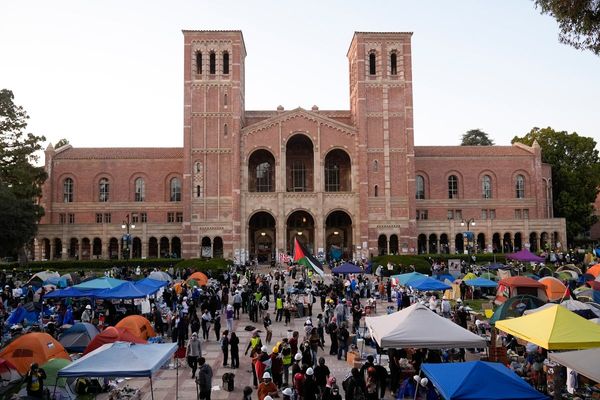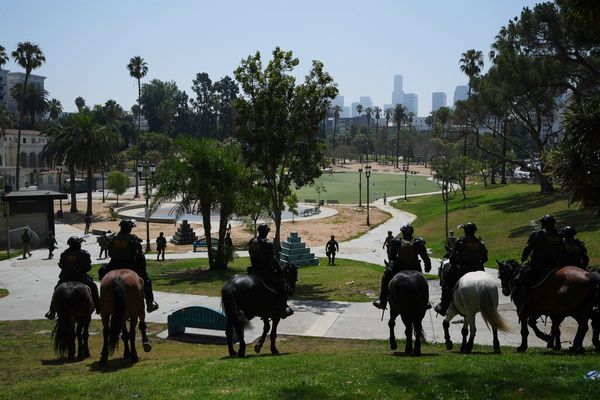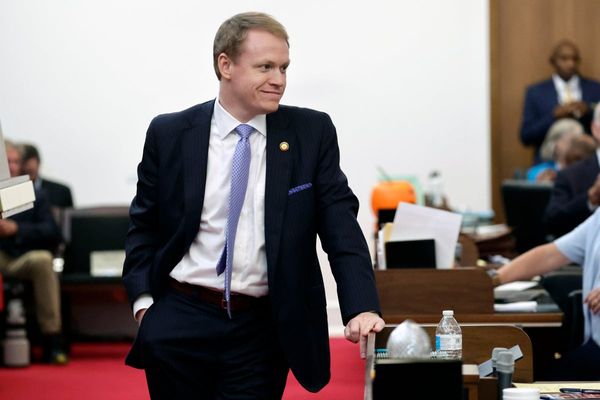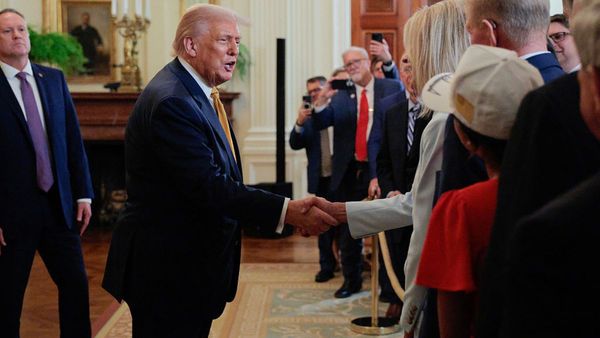
Good morning. Last week, Liz Truss said she was prepared to be unpopular, so she’s presumably completely relaxed this morning about a new round of polls that variously show her government 19, 17, 21, and 33 points behind Labour.
33 points! That’s an extinction level event for the Tories, and unlikely to have been improved by the prime minister’s masochism tour of BBC local newsrooms yesterday, a series of car crashes Evel Knievel would have thought a little much. I have a friend who abandoned their new spouse in economy when they got an in-flight upgrade to business class the day after the wedding, and even they had a better honeymoon than this.
The polling numbers are the prime minister’s problem; the mortgage rates, bond yields, value of the pound, and FTSE 100 index are terrifying for the rest of us. When assessing the impact of chancellor Kwasi Kwarteng’s budget last week, one phrase has hung in the air: “panicked markets”. (The markets, we are also told, are “not reassured”.)
But that’s such an abstract, flattening idea: it makes the markets sound like an ant colony, or the Borg. When trying to make sense of the current turmoil, it’s helpful to try to remember that what markets are made up of is actual human beings, watching the same excruciating interviews as the rest of us.
So. Today’s newsletter, with the help of the Guardian’s financial editor Nils Pratley and an extremely frank banker who prefers to remain anonymous, is an attempt to understand what those markets are, who drives them, and what it is about the government’s policies that has them reaching for the Xanax. Here are the headlines.
Five big stories
Ukraine | Vladimir Putin will formalise the annexation of territories in occupied Ukrainian regions on Friday following a series of sham referendums. Meanwhile, Swedish authorities reported a fourth leak on one of the two Nord Stream pipelines believed to have been the target of sabotage.
Economy | More than 40% of available mortgages have been withdrawn from the market, after last Friday’s government “mini-budget” caused significant financial uncertainty.
Law | Barristers in England and Wales will vote on whether they should end their indefinite strike after a new pay offer from the government, which includes a package of reforms and legal aid fees.
UK news | Detectives have arrested a 34-year-old man on suspicion of the murder of nine-year-old Olivia Pratt-Korbel in Liverpool in August, Merseyside police have said. The force had already arrested nine other men but all have been bailed.
Monarchy | A new 50p design featuring an image of King Charles III has been unveiled by the Royal Mint and will enter circulation by the end of the year. As is tradition, the King’s portrait will face to the left, the opposite direction from Queen Elizabeth II.
In depth: ‘This is a bad policy, but it’s badly presented, as well’

***
Who are the traders moving the market?
The “investors” who come up a lot in coverage of the current economic turmoil may sound quite mysterious, or invoke images of the Monopoly man in a top hat or Jay Duplass’ rapacious slacker capitalist in Industry, depending on your cultural reference points. The reality, Nils Pratley sadly confirms, is a bit more institutional and dull.
First of all, “the people holding three phones on a trading floor are executing orders they’ve been given, not making the decisions themselves”, he said. “Some are bought by individuals, but bonds are typically bought by bodies like sovereign wealth funds or pension funds” – as everybody learned on Wednesday, when the Bank of England made a £65bn move to shore up the market in “gilts”, or UK government bonds, for fear that their plummeting value could lead to a situation where pension funds couldn’t pay their debts.
(A brief aside: a bond is basically an IOU the government sells into the market, promising to pay the bearer a given sum after a given period and pay interest in the meantime, in order to raise funds. That IOU can be sold on, and if the UK looks less certain to be able to pay back the loan, it naturally becomes less valuable. For helpful definitions of more of the terms flying about at the moment, see this glossary by Larry Elliott.)
Nils said that “banks also need a lot of bonds as part of their core capital” – the assets held so that they can continue to function under unforeseen circumstances.
Similarly, while there are small traders buying and selling pounds and dollars on their phones, the currency market is used in large part by more conservative actors like companies which wish to hedge the risk of fluctuations in the exchange rate.
“So say I’m a British car manufacturer importing widgets from Germany, and they’re priced in euros,” Nils said. “I want to be sure about the price I’m paying in sterling, so I use a ‘currency swap’ [buying a foreign currency at a fixed rate to hedge against any risk of exchange rate fluctuations]. And the traders implementing this will be dealing in the currency market.”
***
So are they ‘city slickers betting against UK plc’?
That’s the headline from the front page of the Daily Mail earlier this week, which blamed the reaction to chancellor Kwasi Kwarteng’s budget on “speculators profiting from the plunging pound”. The answer is … not really. “Clearly, there are hedge funds that can make naked bets on currency movements that are unrelated to any other business activity,” Nils said. “But it’s a very small part of it. And in terms of their ability to move markets, it’s tiny. Currencies don’t move in the way sterling has without a very large shift in the consensus across a broad pool of investors.”
Even someone like hedge fund manager/Conservative donor/cartoon villain Crispin Odey – who made £220m by shorting the pound even as he supported Brexit and now describes new bets against the pound and UK gilts as “the gifts that keep on giving” – is not suddenly capitalising on a moment of market panic: Odey has held “short” positions, betting that the pound and the value of gilts will diminish, for months.
Asked to summarise the reasons for the current economic turmoil yesterday, our anonymous banker summarised the situation pretty pithily in a text: “Financial markets are complicated, cautious, sensible, regulated places – if you throw the rulebook out the window, £ shits the bed.”
Elaborating on the phone, the banker said: “The foreign exchange market is one of the biggest markets there is. When you talk about speculators attacking stuff, that’s more like the GameStop story – choose a single stock, pile in, jam it up. You can’t do that to the pound. People like Odey are more like lucky gamblers.”
***
How are investors making decisions?
“First and foremost, the market wants to see the numbers,” Nils said. “How will what’s been announced affect the UK current account deficit, government borrowing, interest rates? The issue here is – if you execute a really unorthodox economic policy, you have to make a really credible case for how you think it’s affordable and why it’s required.”
As well as an OBR analysis, Kwarteng’s non-budget was missing any detail on how deregulation or spending cuts would make the plan affordable, which he has promised to provide – but not until November. “So this is a bad policy, but it’s badly presented, as well,” says Nils. “Kwarteng and Truss are saying they’ve solved the puzzle of the economy, but they aren’t explaining how they’re going to make it work.”
“It’s not a political or moral judgment,” the banker said. “It’s an economic one. All the bond market cares about is whether it’s going to get its money back, and not too much inflation in the meantime, so you can make a decent return. The market would probably respond quite favourably to some sort of horrific headline like they’re going to sell off half the NHS.” That dovetails neatly with horrific headlines this morning suggesting that ministers are planning £5bn worth of benefit cuts that would cost the average family £1,000 a year.
I asked if the worry might be rooted in a deeper sense that ideology has trumped pragmatism: “That’s quite a sophisticated way to look at it,” the banker said. “Markets are sophisticated in some ways, but they’re also quite basic. Remember that Jamie Vardy quote – ‘chat shit, get banged’. It’s a good idea or it isn’t, and this isn’t.”
***
Is there anything else that shapes these decisions?
Every morning, there’s a meeting in the banker’s department where, they say, “everyone chucks their two penn’orth in trying to make sense of what’s happening. And when we talk about this, nobody can understand it. It’s absolutely mad. Like – lifting the cap on bankers’ bonuses should at least be popular around here, but it’s not. It suggests unpredictability and a lack of judgment and nobody likes that.”
That echoes the conversations Nils has had with people in the industry. “Kwarteng says that on 23 November, he’s going to explain the other half of his package, reassure people with credible reasons that growth can hit 2.5%. Well, I suppose a miracle in theory could happen, and everyone will say, ‘Oh, we hadn’t thought of that – he’s a genius’. But I wouldn’t bet a cent on it.”
All of this speaks to a sense that, on top of the raw numbers, behaviour that falls outside previous norms makes it harder to persuade markets that you are reliable. While temporary squalls like questions over why Kwarteng and Truss have kept a low media profile until yesterday don’t make much difference, the banker said, “if this was a more prudent administration, they might get the benefit of the doubt. But people look back over the last few years, at Boris, Covid mismanagement, the parties, it all bubbles up. It all adds to a sense of uncertainty about what they’ll do next.”
We want to hear from you
Where should Anywhere but Westminster go next?
The team behind Anywhere but Westminster would like your help ahead of their next film series. Where should they go, what should they focus on?
Get in touch here, or by contacting us via WhatsApp by clicking here or adding +44(0)7766780300.
What else we’ve been reading
Liz Truss’s back-to-back appearances on eight local radio stations on Thursday morning backfired severely. Jim Waterson explains why rapid fire interviews in Leeds, Kent and beyond generated more headlines than a slot on Radio 4 might. Nimo
We’re barely in the Truss era, but Stacey Solomon makes a blinding case to take over from the prime minister – as Simon Hattenstone reveals her to be just as nice, and just as smart, as she appears on the TV. Toby Moses, head of newsletters
Tom Phillips captures the mood on the ground ahead of Brazil’s elections this weekend, as former president Luiz Inácio Lula da Silva looks set to make a historic comeback. Nimo
Lists of journalists’ favourite x, y, or z are a perennial winner – but this look at the Guardian’s football writers’ least favourite games is a terrifying insight into cold, wet evenings spent watching goalless draws in Hull. Toby
If you’ve not got any big Friday plans, then I recommend you read this ranking of Bill Murray’s 20 best films by Hadley Freeman and pick one to watch. (I bet you won’t guess what’s number 1.) Nimo
Sport
Football | Everton owner Farhad Moshiri is in talks with US businessman Maciek Kaminski over a deal to sell part of the club to fund development of a new stadium.
Cricket | Liam Norwell’s nine-wicket haul on the last day of the County Championship season saved Warwickshire and relegated Yorkshire to Division Two.
Football | West Brom Women will wear navy shorts with their home kit because of concerns about having to wear white while on their periods.
The front pages

This morning’s Guardian front page says “PM holds crunch talks with watchdog over fiscal chaos”. “Thanks PM” – the Mirror predicts the new £5 coin is “soon to be worth about 50p” and suggests Liz Truss “wiped £32 billion off share prices” just by opening her mouth. “Truss: I’m not for turning” – that’s the Daily Mail. The Times says “Defiant PM set to curb benefits to fund budget” while the Telegraph has “Benefits hit as PM tries to stem the bleeding”. Others lead on the polling. “Tories fear wipeout after three weeks of Truss as PM” says the i, while the Metro has “Labour lead Tories by 33 points”. The PM gets only a puff box on the cover of the Express – “Truss pledges state pensions WILL rise to match inflation” – while its splash is “Peaceful death of Queen from ‘old age’”. The Sun leads with a story about Phil Vickery kissing someone; while in a puff box, Truss is again “not for turning”.
Something for the weekend
Our critics’ roundup of the best things to watch, read and listen to right now

TV
Make Me Prime Minister (Channel 4)
If we judge it on its own terms, it’s a hit. How could adding politics (the top-ranking love-to-hate subject in existence) to the basic recipe – and presenting us with possibly the only breed of people (wannabe politicians) we suspect and despise even more than young, thrusting corporate types – not compel? Technically it’s worth five stars. In every other way, I wish I was dead. – Lucy Mangan
Music
Gabriels – Angels and Queens Part One
If it seems counterintuitive to split your debut album in two, a song like Taboo makes it feel like common sense. The seven songs here last barely 30 minutes, but a powerful, concentrated half hour dose is all you need. Certainly – it’s all you need to stake a strong claim to the title of album of the year. – Alexis Petridis
Film
Mrs Harris Goes to Paris
Preposterous though it may be, this is a terrific family movie in a style audiences may not have seen since Mary Poppins. I hope it’s a box office smash up to Christmas and beyond. – Peter Bradshaw
Podcast
Unearthed: Journeys into the Future of Food
This excellent Kew Gardens series is an intelligent look at an increasingly urgent topic: our failing food systems. Hosts such as the Guardian’s James Wong have fascinating interviews with luminaries including Radio 4 Food Programme’s Dan Saladino. – Alexi Duggins
Today in Focus

Brazil’s election: a last chance to save the Amazon?
Brazilians will go to the polls on Sunday with a stark choice to make about the future of their country. And it is one that will have far-reaching implications for the future of the planet, too, says Tom Phillips
Cartoon of the day | Ben Jennings

The Upside
A bit of good news to remind you that the world’s not all bad

During a concert in Washington, the award winning singer Lizzo paused her performance. As she stood on the stage in a glittery mesh leotard, all the bravado and swagger seemed to dissipate. A woman came on stage with a crystal flute that was made for President James Madison in 1813 by Claude Laurent, a French watchmaker and mechanic. Ordinarily it is stored in the Library of Congress – but on Wednesday Lizzo, a classically trained flautist, made history by playing this 200 year old flute in front of her fans while twerking. “Thank you to the Library of Congress for preserving our history and making history so freaking cool,” she said. “History is freaking cool, you guys.”
Sign up here for a weekly roundup of The Upside, sent to you every Sunday
Bored at work?
And finally, the Guardian’s crosswords to keep you entertained throughout the day – with plenty more on the Guardian’s Puzzles app for iOS and Android. Until Monday.
• This article was amended on 1 October 2022. An earlier version misspelled Evel Knievel as “Evil Kneivel”.







